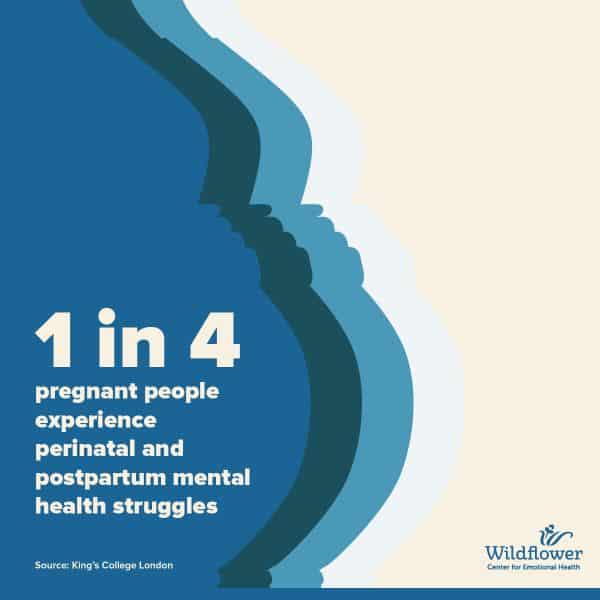Mental Health Stigma During Pregnancy
Pregnancy is a transformational period in life. You may experience joy, comfort, or excitement as you navigate your pregnancy journey, which are emotions that may feel welcomed and special. Additionally, a myriad of less pleasant emotions can also surface during pregnancy including sadness, loneliness, anxiety, discouragement, anger, and fear. Pregnant people may experience these emotions for different reasons and may even experience guilt for feeling anything other than joy during pregnancy. Indeed, the sentiment we often hear of pregnancy being the most joyful time of life may not be true for everyone. This is completely ok and much more common than you might think.
Perhaps you’ve struggled with infertility, miscarriage, loss of a child, pregnancy termination, or navigating the profound physical and emotional changes of a previous pregnancy. Every person’s pregnancy journey is different, and it is understandable to experience a wide variety of thoughts and emotions during this time. However, societal and cultural stigma regarding mental health during pregnancy often prevent people from feeling safe enough to open up to others about their struggles. Stigma, as defined by Merriam-Webster’s dictionary, is a “mark of shame or discredit.”
Common expectations of pregnancy being the most joyful time in life may further shame folks who experience depression and anxiety during their pregnancies. There is nothing wrong with feeling joy and excitement as you expect your child. This being said, it is also a valid and common experience to struggle with a mental health disorder during this time. As of 2019, 1 in 4 pregnant people experience perinatal and postpartum mental health challenges, according to research by King’s College London. Your emotions—all of your emotions—deserve validation and recognition. You are not alone. There are strategies to challenge harmful stigma, reclaim what is important to you, and center your individual emotions during your pregnancy journey.

Strategies to challenge stigmatizing or judgmental thoughts about less pleasant emotions during pregnancy may include ACT-based tools. ACT is an evidence-based therapeutic approach that focuses on acceptance of thoughts and emotions—rather than on changing them—as well as living in accordance with personal values. Here are some ACT-based tools that can help in coping with unhelpful or judgmental thoughts about unpleasant emotions during pregnancy:
Cognitive Defusion
When we are “fused” with our thoughts, our thoughts tend to guide or dictate our behavior, and we may treat these thoughts as facts. For example, if you feel sadness or anger during your pregnancy, a fused thought may look like: “It is wrong to feel sadness or anger during pregnancy. I should be more grateful” or “I am a bad mom for feeling sadness or anger during this time.” “Defusing” from these thoughts allows you the opportunity to create distance between yourself and unhelpful thoughts in order to reduce the power they have over you. Defusion techniques allow you to notice thoughts rather than buy into them, and to allow unhelpful thoughts to come and go instead of acting on them. Some techniques for defusion include:
- Using your “external voice” in order to create distance between yourself and the thought. For example, rather than saying “It is wrong to feel this way”, say “I am having the thought that it is wrong to feel this way.”
- Using creative imagery to defuse yourself from unhelpful thoughts. For example, when a thought that sounds judgmental or critical of your emotions surfaces, try treating that thought as an internet pop-up ad and practice gently and non-judgmentally closing that ad.
- Saying the thought slowly and noticing if this changes the power that the thought has. Does this shift how you experience the thought? Is the thought as painful or upsetting as before?
These practices may allow you to decrease self-judgment and make space for all emotions. Furthermore, accepting emotions as valid may allow more time to focus on what you find important and valuable as a parent.
Values Exploration
Values provide meaning and purpose in our lives and guide our behavior. As you work to feel less fused to thoughts on how you should act or feel, exploring your values may feel empowering and allow you to reflect on what is important to you as a person and as a parent. Values exploration in ACT-based therapy may involve narrowing down your core values that guide how you live your life and interact with others. Additionally, you may explore questions such as, “What characteristics are important to you to support and instill in your child?” or, “If you could simply enjoy being a mom without the need to be ‘right’ and fear judgment or pressure from others, what would you do?” These questions explore what is important and unique for you and your family. You may be surprised and excited by what you uncover! Identifying values and living in accordance with your values may further promote feeling more present in your daily life as well as strengthen meaning and connection to your pregnancy journey and development as a parent.
Mindfulness
Being more aware of your daily actions and feelings—whether through defusion or exploration of values—strengthens your presence within the here and now. Mindfulness, as described by ACT practitioner Dr. Russell Harris, is “the defused, accepting, open contact with the present moment” and “bringing awareness to your experience with openness, interest, and receptiveness.” Often we feel drawn to change an unpleasant thought or feeling related to pregnancy and fall into the expectations of how we “should and should not” feel. Slowing down and taking notice of thoughts and emotions, rather than acting on them or forcing them away, allows for greater presence of the moment and acceptance of whatever arises instead of judging it. As with defusion, mindfulness allows for thoughts and feelings to come and go rather than treating them as facts that require action. A well-known mindfulness exercise that may be helpful to practice is “leaves on a stream.”
Gently allow this thought or feeling to stick to the leaf, rather than yourself, and send that thought or feeling away down a flowing stream. Allow yourself to be still wherever you are, take notice of thoughts and feelings (even those that may be pleasant!), and allow those sensations to come and go rather than feel as though you need to do something about them. You might try this the next time you have a moment to yourself. Notice the moment, the here and now, and allow all thoughts and feelings to come and go.. Developing and practicing skills such as defusion and mindfulness and exploring and acting in accordance with your values re-engages your attention to the present moment and what is important for you during this pivotal time. All of your emotions are worthy of acceptance, recognition, and care.
![]()
Wildflower Center for Emotional Health is a therapy practice with offices in Chicago (River North) and Oak Park, IL. We offer in-person services at each of our locations as well as online therapy to anyone in Illinois. We specialize in perinatal and reproductive health, trauma and PTSD, anxiety and depression, relationships, sex and intimacy concerns, and more.Learn More


